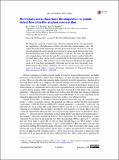Multi-strata subsurface laser die singulation to enable defect-free ultra-thin stacked memory dies
Author(s)
Teh, Weng Hong; Boning, Duane S; Welsch, Roy E
Download1.4921205.pdf (4.594Mb)
PUBLISHER_CC
Publisher with Creative Commons License
Creative Commons Attribution
Terms of use
Metadata
Show full item recordAbstract
We report the extension of multi-strata subsurface infrared (1.342 μm) pulsed laser die singulation to the fabrication of defect-free ultra-thin stacked memory dies. We exploit the multi-strata interactions between generated thermal shockwaves and the preceding high dislocation density layers formed to initiate crack fractures that separate the individual dies from within the interior of the die. We show that optimized inter-strata distances between the high dislocation density layers together with effective laser energy dose can be used to compensate for the high backside reflectance (up to ∼ 82%) wafers. This work has successfully demonstrated defect-free eight die stacks of 25 μm thick mechanically functional and 46 μm thick electrically functional memory dies.
Date issued
2015-05Department
Massachusetts Institute of Technology. Department of Electrical Engineering and Computer Science; Massachusetts Institute of Technology. Department of Urban Studies and Planning; Massachusetts Institute of Technology. Institute for Data, Systems, and Society; Sloan School of ManagementJournal
AIP Advances
Publisher
AIP Publishing
Citation
Teh, W. H., D. Boning, and R. Welsch. “Multi-Strata Subsurface Laser Die Singulation to Enable Defect-Free Ultra-Thin Stacked Memory Dies.” AIP Advances 5, no. 5 (May 2015): 057128.
Version: Final published version
ISSN
2158-3226